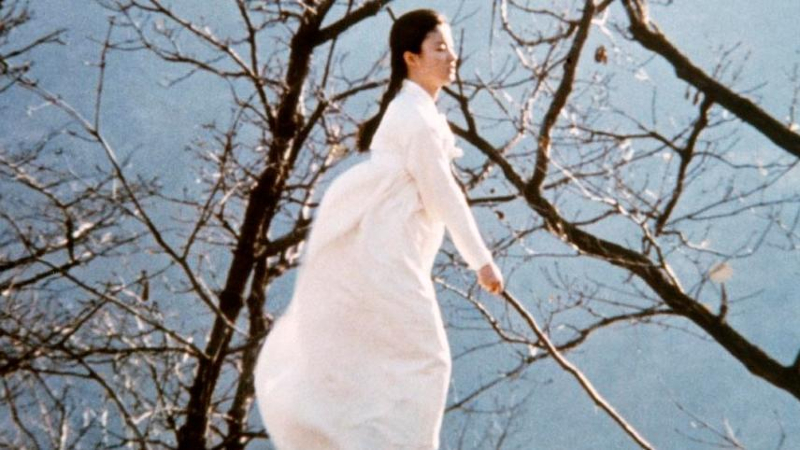Director – Im Kwon-Taek – 1993 – South Korea – 113m
****
Free to view in the Korean Film Archive as part of
Korean Film Nights Online: Trapped! The Cinema of Confinement
(Friday, July 17th – Thursday, August 27th)
Viewing links at bottom of review.
Itinerant pansori singer Yoobong (Kim Myung-gon) travels between small country towns to practice his trade, entertaining audiences on the streets and in their houses after meals. Travelling with him are his two small children, Songhwa and her little brother Dong-ho. In the town where first we meet him and his family, he’s involved in a passionate relationship with a woman.
However not long after we (and indeed little Dong-ho, who the couple assume to be asleep when he isn’t) watch the couple make love, she is seen in the equally ecstatic if clearly painful throes of a childbirth which kills her and from which no living child is born. Yoobong, arriving at the scene after her death, is stricken with grief and holds her body in his arms to weep over it.
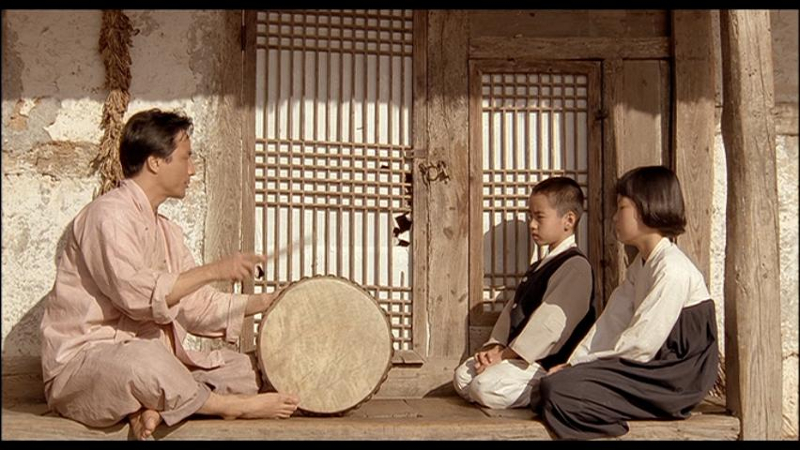
What follows in basically a three-hander, with the father raising the two kids as practitioners of pansori, a traditional form of Korean folk music waning in popularity between the 1940s and 1970s when the film is set. Songhwa (played as an adult by Oh Jung-hae) is a truly gifted singer who he pushes hard to develop her technique, while he’s a lot less enamoured of Dong-ho to whom he gives the supporting role of drummer. However, the father is never really satisfied with the standard of the son’s playing.
Eventually, the grown up Dong-ho (Kim Kyul-chu) has had enough and leaves, but his departure would seem not to serve him well. All we see of him after that is his search through a variety of towns and inns for his long lost sister. She is now blind while their father has died some years before. The film adopts a lot of flashbacks from Dong-ho’s point of view, although some of these are quite lengthy and feel more like the present than flashbacks while you’re inside them.
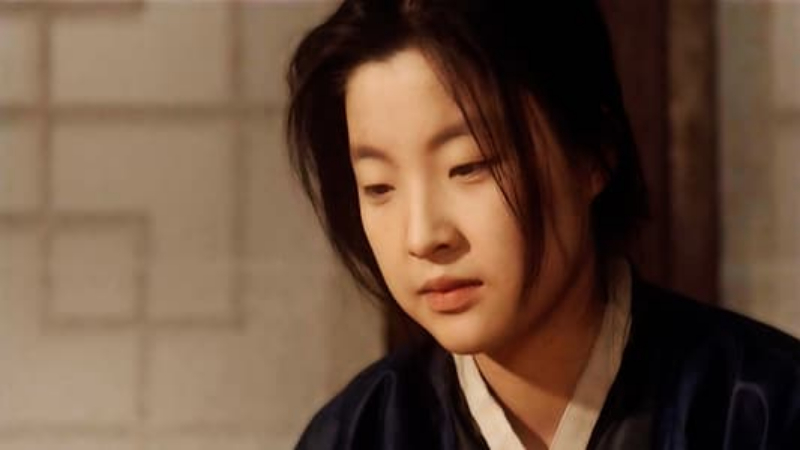
It’s a curious film, a story in which the parts we see seem to be fragments of a larger whole. Both Yoobong and his lover at the start of the film have been bereaved of previous partners, neither of whom appear in the film and about whom we know next to nothing.
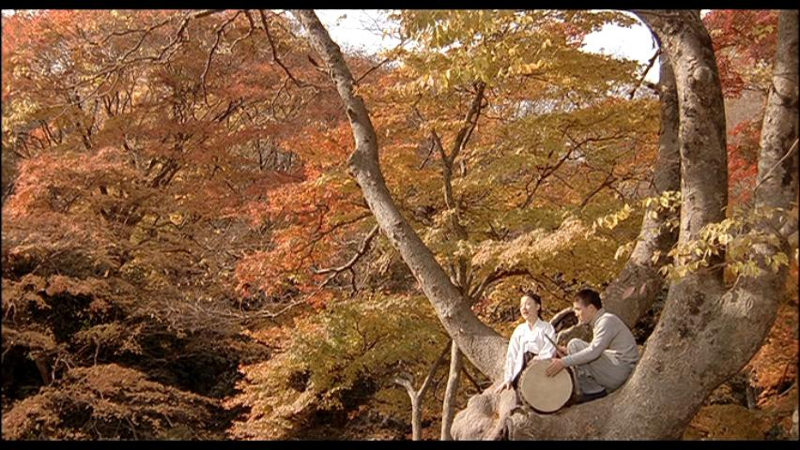
The two kids aren’t his blood relatives either, but appear to have been picked up somewhere along the way (not dissimilar to the family in Shoplifters, Hirokazu Kore-eda, 2018) as a means for him to pass on his inheritance. In his case, this is to teach pansori to the next generation to preserve his art and ensure it survives him after he’s gone.
Yoobong cares little for his daughter beyond turning her into a truly great singer, insisting that she needs a greater understanding of sorrow to improve her singing. After her brother has left, Yoobong feeds Songhwa a bowl of food which causes her to go blind. This causes her to be more dependent on him. It also renders her much more vulnerable once he dies. In order to survive, she must live in a series of both inns and by implication sexual relationships with their landlords.
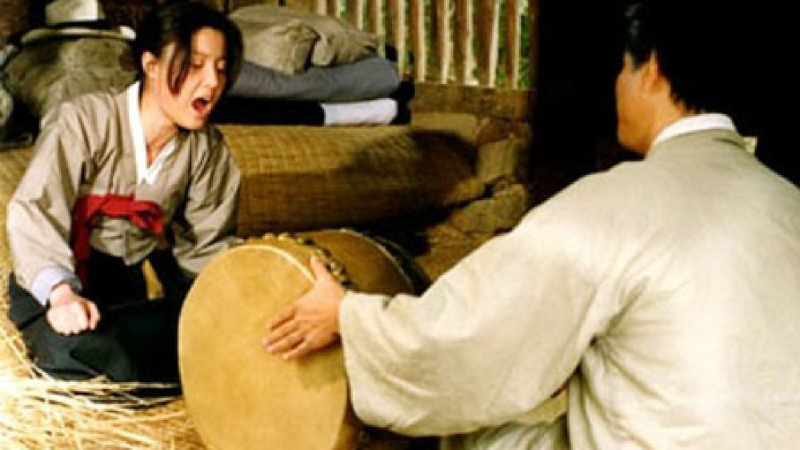
***SPOILER ALERT (SKIP THIS PARAGRAPH)*** Dong-ho eventually tracks her down to one such inn where he sits to hear here sing. As she does so, he plays the drum. They exchange no conversation, the joint musical performance is enough. He leaves on a country bus while she is led off by a little girl along a dyke, as if both are heading each into their own separate oblivion.
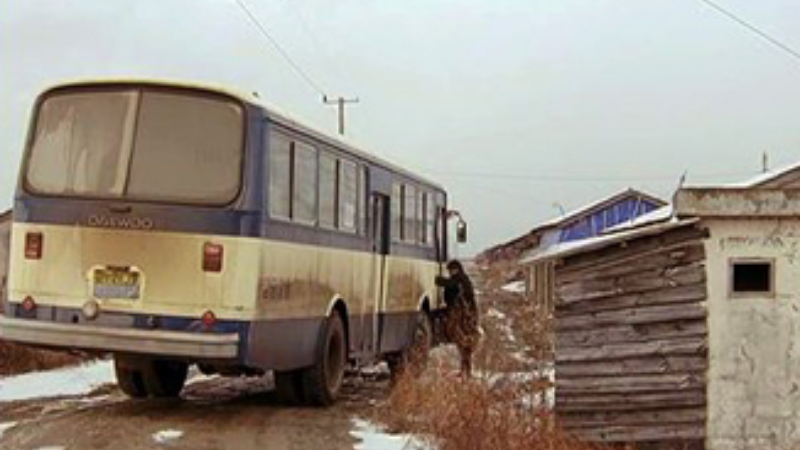
The in-town episodes in streets and inside houses are punctuated by road movie sequences as the family and later the father and daughter move from town to town. Apart from the very end sequence when Songhwa is lead along the dyke, we don’t really see the daughter travelling alone, although she must do so and indeed is shown walking through a rural area with a blind person’s stick in a brief flashback.
We see her brother along going from town to town trying to track her down, though. What we don’t see is what happens to him in between leaving the family and deciding to search for his sister.
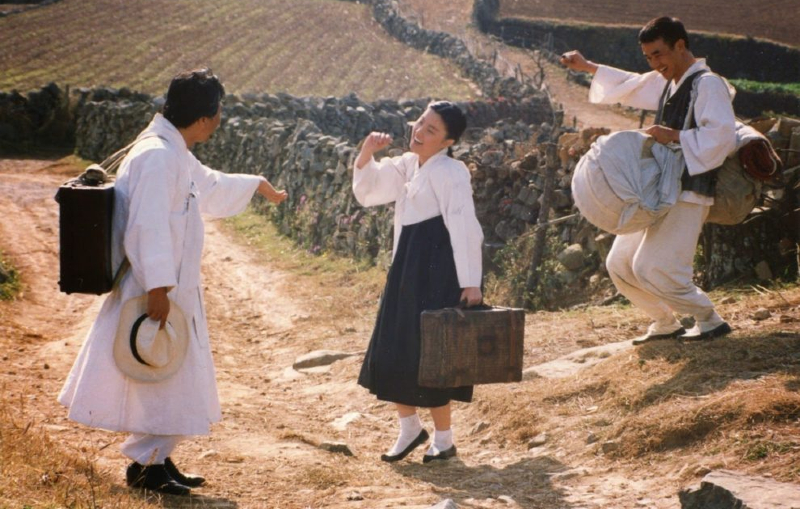
These road movie sequences lend a slow pace to the film, often covering seasons such as vibrant autumn and bleak, blizzard-bound midwinter. The most memorable has the three of them walking up a slope towards the camera and a hairpin bend, singing a lengthy rendition of the song Arirang which seems to keep them going in much the same way sea shanties used to keep sailing ships’ crews going at sea.
The film is as interested in exploring the closed family unit as a theatre of confinement as it is in preserving and showcasing the pansori performances and songs, which element may well have been the factor that made the film a huge hit in South Korea. It’s therefore a strange conclusion to the Trapped! season, because the confinement here is much more psychological and familial than it is geographic. The family is trapped within a dying art form and parent/child relationships much more than within the physical limitations of walls, interiors and physical space.
Curiously, for this writer, Songhwa’s onset of blindness, caused by external factors, recalls the loss of senses (the last of which to be lost is sight) in a very different film, the Scottish pandemic drama Perfect Sense (David Mackenzie, 2012).If this latter film were Korean not Scottish, it would fit into this season perfectly.
Sopyonje is available free to view in the UK in the Korean Film Archive as part of
Korean Film Nights Online: Trapped! The Cinema of Confinement
(Friday, July 17th – Thursday, August 27th)
Trailer:
Intro:
Movie:
Korean Film Nights Online: Trapped! The Cinema of Confinement will be hosted on the koreanfilm website as well as the KCCUK YouTube channel. The recorded introductions will be live at 6pm in a playlist followed by each film, from the Korean Film Archive channel. More info here. http://koreanfilm.co.uk/news/trapped-the-cinema-of-confinement
17/07 – 301/302. Park Chul-Soo (1995) 98m.
30/07 – Eunuch. Shin Sang-Ok (1968) 95m.
13/08 – Transgression. Kim Ki-young (1974) 111m.
27/08 – Sopyonje. Im Kwon-Taek (1993) 113m.
